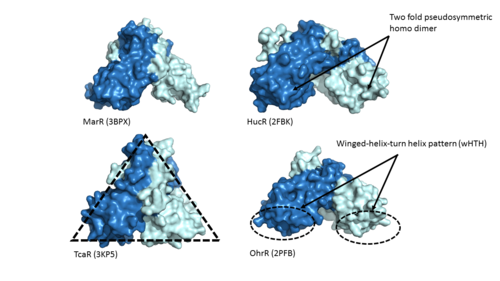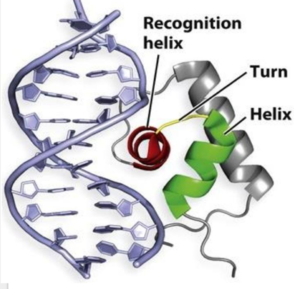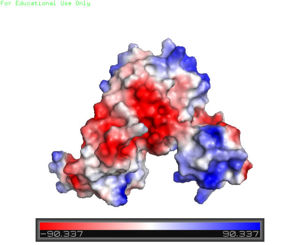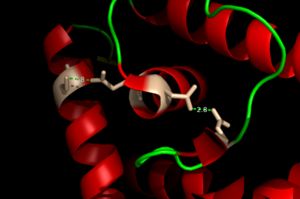We apologize for Proteopedia being slow to respond. For the past two years, a new implementation of Proteopedia has been being built. Soon, it will replace this 18-year old system. All existing content will be moved to the new system at a date that will be announced here.
Sandbox Reserved 1063
From Proteopedia
(Difference between revisions)
| Line 10: | Line 10: | ||
==='''Structural Overview'''=== | ==='''Structural Overview'''=== | ||
| - | One of the two functional domains of AdcR is <scene name='69/694230/Dimerization_domain/3'> dimerization domain</scene>. This domain connects and stabilizes the two pseudosymmetric dimers and is composed of the <scene name='69/694230/Alpha_1/1'>α1 helix</scene>, the C-terminus of the <scene name='69/694230/Alpha_five/1'>α5 helix</scene> , and the <scene name='69/694230/Alpha_6/1'>α6 helix</scene>. This domain is connected to the DNA binding domain by the long α5 helix. The DNA binding domain stabilizes the major and minor groove of DNA via the <scene name='69/694230/Whth_4/5'>winged helix-turn-helix (wHTH)</scene> motif. Binding of Zinc allows AdcR to bind DNA and activate the transcription of high-affinity Zinc specific uptake transporters. The binding of Zinc to the <scene name='69/694230/2_binding_sites/ | + | One of the two functional domains of AdcR is <scene name='69/694230/Dimerization_domain/3'> dimerization domain</scene>. This domain connects and stabilizes the two pseudosymmetric dimers and is composed of the <scene name='69/694230/Alpha_1/1'>α1 helix</scene>, the C-terminus of the <scene name='69/694230/Alpha_five/1'>α5 helix</scene> , and the <scene name='69/694230/Alpha_6/1'>α6 helix</scene>. This domain is connected to the DNA binding domain by the long α5 helix. The DNA binding domain stabilizes the major and minor groove of DNA via the <scene name='69/694230/Whth_4/5'>winged helix-turn-helix (wHTH)</scene> motif. Binding of Zinc allows AdcR to bind DNA and activate the transcription of high-affinity Zinc specific uptake transporters. The binding of Zinc to the <scene name='69/694230/2_binding_sites/4'>XZinc binding pocket</scene> induces a conformational change that allows for a hydrogen bond network between helices of the binding domain. It is believed that this hydrogen bond network is the allosteric activator needed to expose residues that bind the bases along the major groove of the DNA <ref name="guerra">PMID:22085181</ref>. The binding sites are found adjacent to the DNA binding domain. |
| Line 20: | Line 20: | ||
== '''Zn(II) Binding''' == | == '''Zn(II) Binding''' == | ||
| - | Zinc-Dependent Transcriptional Regulator AdcR has <scene name='69/694230/2_binding_sites/ | + | Zinc-Dependent Transcriptional Regulator AdcR has <scene name='69/694230/2_binding_sites/4'>two binding sites</scene> on each of its two protomers and can bind a total of four Zn(II). The <scene name='69/694230/Alpha1-alpha2_loop/2'>α1-α2 loop</scene> combined with the <scene name='69/694230/Alpha_five/1'>α5 helix</scene> and <scene name='69/694230/Alpha_2/1'>α2 helix</scene> make up the <scene name='69/694230/Two_binding_sites/2'>metal binding sites</scene>. Each protomer has one high affinity site (Binding site 1; KZn<sub>1</sub> = 10<sup>12</sup> M; pH 8) and one low affinity binding site (Binding Site 2; KZn<sub>2</sub> = 10<sup>7</sup> M; pH 8) <ref name="Reyes">PMID:20804771</ref>. The metal binding pockets of the AdcR MarR transcriptional regulator are made up of the DNA binding domain with the extended α1-α2 loop. The two different Zn(II) binding sites are connected via <scene name='69/694230/Hydrogen_bonding/5'>hydrogen bonding</scene> of H108 and E41. |
=== Binding Site 1 === | === Binding Site 1 === | ||
<scene name='69/694230/Binding_site_1/5'>Binding site 1</scene> consists of a distorted tetrahedral geometry around Zn(II). The four amino acids involved in zinc binding are E24, H42, H108, and H112. Binding site 1 is the only binding site that plays a significant role in the protein's regulatory function. The ability of binding site 1 to coordinate to the Zn(II) ion is pH dependent. At pH 6 the binding affinity for the Zn(II) ion is 10<sup>9</sup> - 10<sup>10</sup> M<sup>-1</sup>, but at pH 8 the binding affinity increases to 10<sup>12</sup> M<sup>-1</sup> <ref name="Reyes" />. This is due to the charges on the histidines of the binding site. At pH 6, the histidines are positively charged and are not able to interact with the positively charged Zn(II) ion. However, at pH 8 the histidines are neutrally charged and are able to coordinate with Zn(II), which increases the overall binding affinity. The AdcR MarR transcriptional regulator is able to bind Co(II) in binding site 1 in a way that induces similar conformational changes to Zn(II) binding. Co(II) coordination in binding site 1 is able to allosterically activate DNA binding similarly to Zn(II) binding <ref name="guerra" />. | <scene name='69/694230/Binding_site_1/5'>Binding site 1</scene> consists of a distorted tetrahedral geometry around Zn(II). The four amino acids involved in zinc binding are E24, H42, H108, and H112. Binding site 1 is the only binding site that plays a significant role in the protein's regulatory function. The ability of binding site 1 to coordinate to the Zn(II) ion is pH dependent. At pH 6 the binding affinity for the Zn(II) ion is 10<sup>9</sup> - 10<sup>10</sup> M<sup>-1</sup>, but at pH 8 the binding affinity increases to 10<sup>12</sup> M<sup>-1</sup> <ref name="Reyes" />. This is due to the charges on the histidines of the binding site. At pH 6, the histidines are positively charged and are not able to interact with the positively charged Zn(II) ion. However, at pH 8 the histidines are neutrally charged and are able to coordinate with Zn(II), which increases the overall binding affinity. The AdcR MarR transcriptional regulator is able to bind Co(II) in binding site 1 in a way that induces similar conformational changes to Zn(II) binding. Co(II) coordination in binding site 1 is able to allosterically activate DNA binding similarly to Zn(II) binding <ref name="guerra" />. | ||
Revision as of 18:24, 21 April 2017
Adhesin Competence Regulator
| |||||||||||
References
- ↑ Sanson M, Makthal N, Flores AR, Olsen RJ, Musser JM, Kumaraswami M. Adhesin competence repressor (AdcR) from Streptococcus pyogenes controls adaptive responses to zinc limitation and contributes to virulence. Nucleic Acids Res. 2015 Jan;43(1):418-32. doi: 10.1093/nar/gku1304. Epub 2014 Dec, 15. PMID:25510500 doi:http://dx.doi.org/10.1093/nar/gku1304
- ↑ Fraústo da Silva J, Williams R. The Biological Chemistry of Elements: The Inorganic Chemistry of Life. Second ed. Oxford University Press; Oxford: 2001.
- ↑ Ma Z, Jacobsen FE, Giedroc DP. Coordination chemistry of bacterial metal transport and sensing. Chem Rev. 2009 Oct;109(10):4644-81. doi: 10.1021/cr900077w. PMID:19788177 doi:http://dx.doi.org/10.1021/cr900077w
- ↑ 4.0 4.1 4.2 4.3 Guerra AJ, Dann CE, Giedroc DP. Crystal Structure of the Zinc-Dependent MarR Family Transcriptional Regulator AdcR in the Zn(II)-Bound State. J Am Chem Soc. 2011 Nov 21. PMID:22085181 doi:10.1021/ja2080532
- ↑ 5.0 5.1 Reyes-Caballero H, Guerra AJ, Jacobsen FE, Kazmierczak KM, Cowart D, Koppolu UM, Scott RA, Winkler ME, Giedroc DP. The metalloregulatory zinc site in Streptococcus pneumoniae AdcR, a zinc-activated MarR family repressor. J Mol Biol. 2010 Oct 22;403(2):197-216. doi: 10.1016/j.jmb.2010.08.030. Epub 2010, Sep 8. PMID:20804771 doi:http://dx.doi.org/10.1016/j.jmb.2010.08.030




